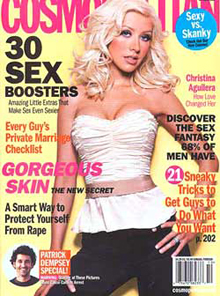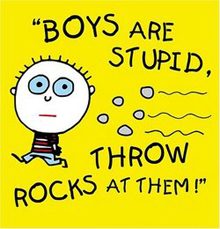 You gotta love the opening scene of Al Gore’s An Inconvenient Truth.
You gotta love the opening scene of Al Gore’s An Inconvenient Truth.
The former presidential candidate takes the stage, PowerPoint clicker in-hand. His famous Global Warming Slideshow appears on the enormous screen in the background. Thousands of bright-eyed college students anxiously await his opening remarks.
The applause fades. The crowd falls silent.
And the first words out of Al Gore’s mouth are, “Hello, my name is Al Gore, and I used to be the next president of the United States.”
The students roar with laughter! Cheers, whistles and applause echo from the auditorium for the next 20 seconds. Even Gore chuckles a bit to himself on stage.
At that very moment, you realize something: Al Gore has every single one of those students in the palm of his hand. Instantly, he’s become likeable, funny, and, believe it or not, sort of cool.
BEHOLD! The amazing power of self-deprecating humor:
It neutralizes conflict.
It makes other want to be around you.
It is the fastest way to someone’s heart.
It is a key indicator of emotional intelligence.
It defuses an otherwise tense or difficult situation.
It combines modesty and likeability, while at the same time demonstrating that confidence and self-assurance.
The word “deprecation” stems from the Latin deprecari, which means, “to avert by prayer.” Now, although you probably don’t think of poking fun at yourself as praying, self-deprecating humor does help sidestep three communication barriers:
You avoid offending someone. Let’s face it: people have become WAY too sensitive. It’s almost hard NOT to offend someone! Political cartoonist Paul Rigby said it best: “Everyone is on edge. I think that’s a fault in the human species these days. We are all very scared of critical analysis.”
LESSON LEARNED: use self-deprecating humor as a protective measure. It’s safe, it’s fun, and it works. After all, you’re poking fun at yourself! It’s doubtful that anyone else will be take offense.
You avoid threatening someone. Humans tend to gravitate toward people and situations that are the least threatening and uncertain. This is known as the approach/avoid mechanism. Therefore, self-deprecating humor makes you more approachable, both personally and professionally.
PERFECT EXAMPLE: in the April 1997 issue of Men’s Health, psychologist Michael Cunningham reported, “Self-effacing humor isn’t threatening because it points out that a someone is confident enough to risk looking silly.”
You avoid alienating someone. Even individuals with great power and responsibility use self-deprecating humor to their advantage. Landon Parvin, a former speechwriter for Ronald Reagan, helped George W. Bush write the jokes contrasting Bush’s public voice with his supposed inner thoughts.
AMAZINGLY: Parvin, who was responsible for most of the president’s intentional humor, believed this strategy helped win over skeptical voters by increasing Bush’s likeability. What’s more, CNN and MSNBC reports from the 2004 election indicated that Bush’s approachability surpassed that of John Kerry’s.
Still, self-deprecating humor isn’t all fun and games. It has the potential to be disadvantageous. After spending a few Googleable hours researching the topic, I’ve discovered three caveats you must consider before ripping yourself a new one:
1. Gender. Although it probably differs from person to person, two pieces of research caught my attention on this topic. The first comes from Jan Frankel Schau of the Southern California Mediation Association. She wrote, “A woman appears to be lacking in confidence when she engages in self-deprecating humor. This is not to censor her use of humor, but only to enlighten it by pointing out the hidden messages that may be revealed, or that are unintentionally displayed.”
On the other hand, attraction expert and dating coach “Swinggcat,” founder of Real World Seduction, says, “A little self deprecating humor can be powerful; but a man who recites an hour-long standup comedy routine about what a loser his is will make women avoid him like a leper.”
According to Swinggcat, self-deprecating humor violates a fundamental attraction maxim: women are attracted to men with “prizability.” If you want to successfully attract a woman, he says, you need to establish the frame that you are the “prize” in the interaction.
LET ME SUGGEST THIS…
Consider your gender (and that of the people surrounding you) before overdoing the self-deprecation.
2. Intention. Have you ever suspected someone of using self-deprecating humor for sole purpose of getting other people to defend him? According to fascinating report titled The Self-Deprecating Narcissist by Dr. Sam Vaknin, “If a narcissist engages in self-deprecating humor, he expects to be contradicted, rebuked and rebuffed by his listeners (‘Come on, you are actually quite handsome!’), or to be commended or admired for his courage or for his wit and intellectual acerbity (‘I envy your ability to laugh at yourself!’).”
Vaknin concluded with, “As everything else in a narcissist’s life, his sense of humor is deployed in the interminable pursuit of Narcissistic Supply.”
LET ME SUGGEST THIS…
Don’t poke fun at yourself simply so someone else defends the opposite. This will appear manipulative and narcissistic.
3. Frequency. Lastly, offering too many self-deprecating remarks may raise questions about your self-esteem. Famous comedy writer and magician Robert Orben says, “Self-deprecating humor should always be two-pronged. It should comically acknowledge a criticism or situation, but also infer that there is no substance to it and that you’re in the driver’s seat.”
Additionally, saturating yourself with self-deprecating remarks can create a negative, circular pattern. See, humans are what they are because of the way other people see them. So, if you keep telling people that you’re a moron, then people will start to agree with you. After a while, you might start wondering to yourself, “Huh. Maybe I really AM a moron!”
LET ME SUGGEST THIS…
Words are powerful. Make sure that everyone (including yourself) knows that it’s only a joke.
Woody Allen, the world’s most notorious self-deprecator, once said, “Self deprecating humor is all around. It’s a staple of comedians, and should be a staple of people in general.”
Right on, Woody. Besides, if you can’t laugh at yourself, who can you laugh at?
Ultimately, self-deprecating humor is a potent ingredient to enhance your personal and professional communication. With practice, you’ll learn that when the right amount is applied, and done so within the appropriate context, you’ll be sure to maximize your approachability – one conversation at a time.
Besides, if it’s good enough for Al Gore, it’s good enough for you too.
LET ME ASK YA THIS…
What’s the most effective way to use self-deprecating humor?
LET ME SUGGEST THIS…
Post your best SDH story here!
* * * *
Scott Ginsberg
Author/Speaker/That Guy with the Nametag
www.hellomynameisscott.com
add to del.icio.us * digg it! * email this post
 So, I was hoping to have this AMAZING year-end post that (a) wrapped up everything I learned in 2006, (b) left you with a poignant point to ponder or (c) was really, really funny.
So, I was hoping to have this AMAZING year-end post that (a) wrapped up everything I learned in 2006, (b) left you with a poignant point to ponder or (c) was really, really funny.
 A surprisingly great resource for all things approachable is Cosmopolitan magazine.
A surprisingly great resource for all things approachable is Cosmopolitan magazine.  Perhaps the folks at
Perhaps the folks at 
 You gotta love the opening scene of
You gotta love the opening scene of  On the shelves of my father’s library, I recently found a book called Dare to Live, by
On the shelves of my father’s library, I recently found a book called Dare to Live, by 
 My girlfriend drives a pink car. It’s pretty much the sweetest ride you’ll see on the road.
My girlfriend drives a pink car. It’s pretty much the sweetest ride you’ll see on the road.  Tattoos are another great example.
Tattoos are another great example.  Another example: what if someone gets the word “hope” tattooed across her chest? Think she’d slump around all day with woe-is-me posture and depressed eyes?
Another example: what if someone gets the word “hope” tattooed across her chest? Think she’d slump around all day with woe-is-me posture and depressed eyes? Nope, it isn’t “marketing.”
Nope, it isn’t “marketing.” You could argue that free is bad:
You could argue that free is bad: